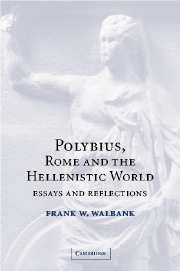Book contents
- Frontmatter
- Contents
- Preface
- Acknowledgements
- List of abbreviations
- 1 Polybian studies, c. 1975–2000
- HISTORICAL AND GEOGRAPHICAL PAPERS
- 2 The geography of Polybius
- 3 Egypt in Polybius
- 4 The surrender of the Egyptian rebels in the Nile delta (Polyb. xxii.17.1–7)
- 5 Two Hellenistic processions: a matter of self-definition
- 6 Polybius and Macedonia
- 7 Sea-power and the Antigonids
- 8 H TΩN OΛΩN EΛΠΙΣ and the Antigonids
- 9 Hellenes and Achaeans: ‘Greek nationality’ revisited
- 10 The Achaean assemblies
- POLYBIUS AS A HISTORIAN
- POLYBIUS ON ROME
- TRANSMISSION OF POLYBIUS
- Bibliography
- Indexes
9 - Hellenes and Achaeans: ‘Greek nationality’ revisited
Published online by Cambridge University Press: 22 September 2009
- Frontmatter
- Contents
- Preface
- Acknowledgements
- List of abbreviations
- 1 Polybian studies, c. 1975–2000
- HISTORICAL AND GEOGRAPHICAL PAPERS
- 2 The geography of Polybius
- 3 Egypt in Polybius
- 4 The surrender of the Egyptian rebels in the Nile delta (Polyb. xxii.17.1–7)
- 5 Two Hellenistic processions: a matter of self-definition
- 6 Polybius and Macedonia
- 7 Sea-power and the Antigonids
- 8 H TΩN OΛΩN EΛΠΙΣ and the Antigonids
- 9 Hellenes and Achaeans: ‘Greek nationality’ revisited
- 10 The Achaean assemblies
- POLYBIUS AS A HISTORIAN
- POLYBIUS ON ROME
- TRANSMISSION OF POLYBIUS
- Bibliography
- Indexes
Summary
I have given this chapter, which deals mainly with Hellenes and Achaeans, the sub-title of ‘Greek Nationality’ revisited. The Greek nationality I am revisiting (though only briefly) is the subject of a paper I wrote long ago in 1951, entitled ‘The Problem of Greek Nationality’. I gave it at the general meeting of the Classical Association held that year in Liverpool and in it I discussed and criticised a view prevalent at that time, that Greek history could be usefully interpreted in terms of ‘a struggle for Greek unity’ and the failure of Greeks to set up a Greek nation. This seemed to me rather an absurd theory for several reasons. One was that to apply the modern idea of a nation to ancient Greece was patently anachronistic. The ‘panhellenic’ note which can be detected in, for instance, the Lysistrata, the Olympian speeches of Gorgias and Lysias or the writings of Isocrates had nothing to do with such a concept. Nor did it seem reasonable to assess people in terms of what they failed to accomplish.
Today, indeed, such an approach to Greek history must seem strangely out-of-date. Although it was adopted at that time by such distinguished historians as Gaetano De Sanctis in Italy and Max Cary in England, its real origins lay in the drive to create a united Germany in the nineteenth century and the nationalism of Bismarck's Reich.
- Type
- Chapter
- Information
- Polybius, Rome and the Hellenistic WorldEssays and Reflections, pp. 137 - 152Publisher: Cambridge University PressPrint publication year: 2002



